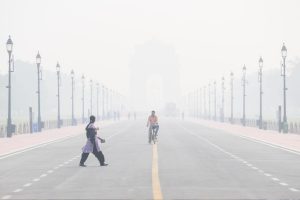In South Korea, the law has not spared any person, not even the President, if they are found to be engaged in wrongdoing and illegal activities. Yoon Suk-yeol is the third South Korean president impeached while in office. In 2016, parliament impeached Park Geunhye, the country’s first female president, over a corruption scandal. The Constitutional Court upheld her impeachment and dismissed her from office.
In 2004, President Roh Moo-hyun was impeached in parliament over an alleged election law violation but the court later overturned his impeachment and restored his presidential powers. But the dramatic development of December 2024 has scarred South Korea’s image as one of East Asia’s democratic strongholds. Many decades ago, the late famous political scientist Robert Scalapino, a much revered scholar on East Asia had written a column wherein he examined the rationale of some of the Asian countries that gained independence after World War II and choose the authoritarian model of governance. Such a choice was acceptable to restore order and carve out a path for rapid economic growth. Examples of South Korea and Taiwan were cited.
Advertisement
This was a transition phase which subsequently led to the establishment of democracy. Unfortunately, South Korea has defied such a model time and again after having accepted the restoration of democracy but having again returned to the authoritarian system of governance. In a column for Japan Forward, Monika Chansoria states that authoritarian regimes in South Korea have declared martial law 15 times since the country’s founding in 1948. Though democracy is still seen as a preferred choice, there are certain flaws, which is why the country’s presidents have attempted to function under authoritarian model of governance with varying consequences. The list below is illustrative of the observation.
1. Syngman Rhee (1948- 1960): Overthrown
2. Yoon Bo-Seon (1960- 1962): Overthrown
3. Park Chung-hee (1962- 1979): Assassinated
4. Choi Kyu-hah (1979- 1980): Removed by a military coup
5. Chun Doo-hwan (1981- 1988): Sentenced to death after the end of the presidential term. Commuted to life imprisonment and later pardoned.
6. Roh Tae-woo (1988- 1993): Sentenced to 22 years in prison after the end of the presidential term. Later pardoned alongside Chun.
7. Kim Young-sam (1993- 1998): Placed under house arrest during the term of President No 3. As president, he secured convictions against two of his predecessors.
8. Kim Dae-jung (1998- 2003): His swearing-in marked for the first time in Korean political history that the ruling party transferred power peacefully to a democratically elected opposition winner. He also introduced engagement with North Korea via the “Sunshine Policy.”
9. Roh Moo-hyun (2003- 2008): Impeached (later overturned by the Constitutional Court). Investigated for corruption after his term and committed suicide.
10. Lee Myung-bak (2008- 2013): Arrested for corruption after his presidency; then sentenced to 15 years in prison.
11. Park Geun-hye (2013- 2017): Impeached and arrested on corruption charges. Sentenced to 24 years in prison.
12. Moon Jae In (2017- 2022): No imprisonment.
13. Yoon Suk-yeol (2022 till date): Survived first impeachment attempt but failed in the second attempt. His fate hangs on the verdict of the Constitutional Court.
For now Yoon has been banned from leaving South Korea. Yoon’s defense minister and police chief and two other high-level figures have been arrested over the martial law enforcement. He has the presidential privilege of immunity from criminal prosecution but that doesn’t extend to allegations of rebellion or treason. Until the ruling by the Constitutional Court, Prime Minister Han Duksoo will serve as the acting president. The court can either exonerate Yoon or remove him from power permanently. The latter is the greater possibility. As Han is an unelected cabinet member, he is not entitled to introduce significant policy shifts during his interim leadership.
The Constitutional Court has up to 180 days to finalise its decision. Previous impeachment proceedings against Roh Moo-hyun and Park Geun-hye took between 63 to 91 days. Some legal experts say Yoon’s case could take longer, as Yoon is set to contest the legal battle head-on. The court’s main task would be to determine whether Yoon’s martial law declaration constitutes an impeachable offense and if it meets the threshold for insurrection. Under Article 65 (1) of the South Korean Constitution, two criteria must be met for presidential impeachment. The actions by the President must relate to his/her official duties. They must also be unconstitutional.
This eliminates personal or partisan matters as grounds for impeachment. The court shall hear arguments from both sides before it adjudicates and issues its verdict. While Yoon is unlikely to accept the arguments of the opposition, legal counsel representing parliament must prove that Yoon aimed to neutralise the legislature. The battle could be fierce. If the court upholds the impeachment motion, Yoon will be removed from office. Otherwise, he will be allowed to complete his remaining term as president. Technically, Yoon could be indicted and arrested. Such an outcome would be unprecedented in South Korea’s history. Even in the case of former President Park Geun-hye (daughter of Park Chung-hee), she was indicted only after her formal removal from office.
If Yoon is found guilty of leading an insurrection, he could face the death penalty or life imprisonment. With the historical irritants stemming from the experiences of the War and colonial period, Japan-South Korea relations had moved on the right track as Prime Minister Kishida and Yoon had taken proactive steps to build a phase of mutual understanding and deal with thorny issues such as comfort wo men and wartime compensation to Korean labour used by the Japanese.
That is now threatened to be undone. There is optimism, however. Though Japan’s Prime Minister Shigeru Ishiba reiterated the importance of Japan-South Korea relations, his forthcoming visit to Seoul seems to have been jeopardised for now owing to the disturbed domestic political situation. This shows that for Japan the manner in which politics have unfolded in South Korea is worrying. The first casualty is that a delegation of Japanese lawmakers, led by former Prime Minister Yoshihide Suga, has cancelled a planned December visit to South Korea.
This aberration does not however imply that a major policy shift towards Japan is likely under Han Duk-soo’s acting presidency. Until the Court comes out with its ruling, Han is likely to maintain the policies of the Yoon administration. So, there shall be continuity in policies. Japan had developed a good understanding with the conservative Yoon administration. If the court exonerates Yoon, he shall return to office to complete the remaining term. If the ruling goes against him, law shall take its own course. That honeymoon phase shall end as the possibility of a liberal take over of the presidency in the up coming election shall loom large. A special election must be held within 60 days of a presidential vacancy. Depending upon the constitutional court’s ruling, that election could occur as early as April or May 2025.
Japan Forward observed in an editorial that “at the moment, opposition leader Lee Jaemyung is ahead in hypothetical polls. Should Lee succeed Yoon, a substantial shift in South Korea’s security and foreign policy is almost guaranteed.” The editorial further observed: “This could strain Seoul’s closest partners in Tokyo and Washington, particularly as non-democratic states ramp up efforts to challenge established international norms”. One can conjecture that the turmoil in Korean politics is sure to continue for some time. This is definitely going to impact the severe on-going regional security environment in Northeast Asia.
As regards North Korea with which South Korea has a long standing ideological battle and continues to face constant threats, the political turmoil in South Korea is good news. Pyongyang would rejoice if the political system in Seoul is destabilised for a longer period. Pyongyang will be encouraged to choose aggressive means to influence opinions through social media and plant spies in South Korea to manipulate public opinion or launch military provocations. North Korea’s Kim Jong-un reacted to Yoon’s martial law declaration by terming it “a shocking incident that pointed the bayonet of dictatorship at the people”. For Kim, the manner the development unfolded so quickly in Seoul signified the fragility of South Korean society.
By reacting the way he did, Kim was justifying to the people in North Korea that Pyongyang’s system is far superior to that of the South. The larger objective is to reinforce the regime’s legitimacy and perpetuate hereditary succession. As a neighbouring country, Japan is best advised to exercise extreme caution and not react unnecessarily. Japan needs to be ready to adjust its diplomatic and defense policies taking into consideration that the political instability is unlikely to end soon. There is yet another twist in the tale. With an unpredictable Donald Trump taking over the US presidency soon, the partner countries need to adjust with his whims and demands. At the moment no one knows what those would be.
But the fact that Trump remarked on 16 December that he gets along well with North Korea’s Kim leaves open room for interpretations by Korea watchers and security analysts. On another occasion, Trump boasted that he was the only leader who properly dealt with Kim during his first term of presidency. During his first press conference after the 5 November election, Trump again mentioned Kim but there was no mention of South Korea throughout the entire event. There are fears that Trump after he takes office in January 2025 would focus more directly with North Korea on nuclear negotiations and bypass South Korea. These could be challenging times for the new leadership in South Korea.
(The writer is former Senior Fellow at the PMML (Ministry of Culture), MP-IDSA (Ministry of Defence), and ICCR Chair Professor (Ministry of External Affairs) at Reitaku University, Japan)











